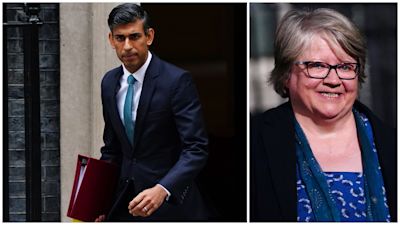COP27: Sunak not focused on ‘just a gathering of people in Egypt’, says environment minister

Labour has accused Rishi Sunak of a "massive failure of leadership" after it was confirmed that the new prime minister will not be attending COP27 in Egypt next month.
Mr Sunak’s predecessor Liz Truss had been planning to attend the key climate summit, but the new prime minister has pulled out because of “domestic commitments” ahead of the Autumn Budget on November 17.
Labour leader Sir Keir Starmer criticised the Prime Minister, tweeting: “Britain showing up to work with world leaders is an opportunity to grasp. Not an event to shun.”
The Environment Secretary defended Rishi Sunak pulling out of the COP27 climate summit by arguing he will show “global leadership” rather than attending “just a gathering of people in Egypt”.
Therese Coffey suggested on Friday the United Nations conference in Sharm El-Sheikh is not one of the “big political summits” despite Joe Biden being expected to attend next month.
Shadow climate change secretary Ed Miliband said the prime minister "fails to understand" that tackling the climate crisis is linked to the UK's "domestic priorities", such as bill costs and energy security.
In an interview with ITV News, he said that the government is "failing to act" on key policies "right across the board".
"Labour would have a clean power system by 2030," he said.
"That wouldn't just be good for tackling the climate crisis. It would cut bills, it would create jobs and it would give us energy security."
Ed Miliband described the summit snub as a 'total failure of leadership'
Downing Street had earlier confirmed that climate minister Graham Stuart will no longer be attending Cabinet, joining Alok Sharma, the COP26 president, who also lost his seat around Mr Sunak’s Cabinet table.
A No 10 spokeswoman on Thursday said that Mr Sunak, who has promised to prioritise the environment, would not be travelling to the UN's COP27 summit, due to take place in Sharm el-Sheikh, from November 6 to 18.
She told reporters: “The prime minister is not expected to attend COP27 and this is due to other pressing domestic commitments including preparations for the Autumn Budget.
“The UK will be fully represented by other senior ministers as well as Cop President Alok Sharma.”
The annual UN climate summits are designed to help governments agree steps to curb global temperature rises. The UK hosted COP26 in Glasgow in 2021, which Mr Sunak attended, as the then-chancellor.
Former cabinet members Nadine Dorries and Jacob Rees-Mogg both took to twitter to voice their opinions on whether or not the PM should attend the conference.
Downing Street said the new PM remains “absolutely committed” to supporting the climate conference, denying that the decision to skip the global meeting signalled a downgrading of climate change as a priority.
The spokeswoman added: “It is a recognition of other pressing domestic commitments, not least preparations for the Autumn Budget.”
She said: “We remain committed to net zero and to leading international and domestic action to tackle climate change. The UK is forging ahead of many other countries on net zero.“
"We will obviously continue to work closely with Egypt as the hosts of COP27 and to make sure that all countries are making progress on the historic commitments they made at the Glasgow climate pact.”
The news that Mr Sunak will not be attending the key summit came after a UN report warned that there is "no credible pathway" to keep the rise in global temperatures below the threshold of 1.5C.
The world is already seeing increasing floods, storms, heatwaves and wildfires as a result of climate change, and beyond 1.5C of warming, more devastating weather extremes, crop damage and losses of key systems such as coral reefs are expected. To get on track for limiting warming to 1.5C and avoid the most dangerous climate extremes, annual emissions must be reduced by 45% in just eight years, and continue to decline rapidly after that, the UNEP report said, a major reversal of current rises in pollution.
Current climate policies put the world on track for warming of 2.8C.
Want a quick and expert briefing on the biggest news stories? Listen to our latest podcasts to find out What You Need To Know